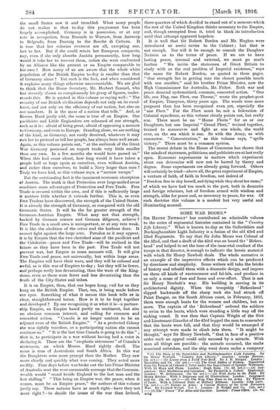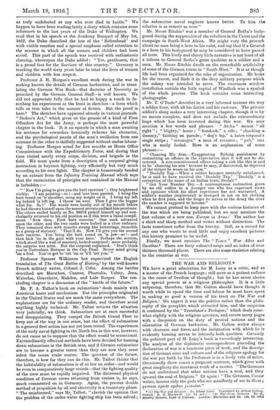SOME WAR BOOKS.*
Sin HENRY NEWBOLT i has contributed an admirable volume to the series of regimental histories contained in the " Country Life Library." What is known to-day as the Oxfordshire and Buckinghamshire Light Infantry is a fusion of tho old 43rd and 52nd Regiments. To say that Sir John Moore was Colonel of the 52nd, and that a draft of the 43rd was on board tho Birken- head' and helped to set the tone of the immortal conduct of the troops in that disaster, is enough to indicate the heroic material with which Sir Henry Newbolt deals. The whole narrative is an example of the impressive effects which can be produced by directness and simplicity. Some writers will take the bricks of history and rebuild them with a dramatic design, and impose on them all kinds of excrescences and fal-lals, and produce in us only a sense of fuss and fume and over-effort. That is not Sir Henry Newbolt's way. His building is moving in its architectural dignity. When the troopship ' Birkenhead' slipped backwards off the sharp rock she had struck off Point Dangor, on the South African coast, in February, 1852, there were enough boats for the women and children, but no more. The captain of the Birkenhead ' ordered the soldiers to swim to the boats, which were standing a little way off the sinking vessel. It was then that Captain Wright of the 91st and Lieutenant Girardot of the 43rd bogged the men to remember that the boats were full, and that they would be swamped if any attempt were made to climb into them. " It might be thought," says Sir Henry Newbolt, " that in face of a positive order such an appeal could only succeed by a miracle.. With man all things are possible : the miracle occurred, the ranks remained unbroken, and the ship went down under a company • (1) The Story of the Oxfordshire and Buckinghamshire Light Infantry. By Sir Henry Newbolt. "Country Life Library." London : Georgo Newnes. [6s. net.)—(2) Leaves from a Field Note-Book. By J. H. Morgan. London : Macmillan and Co. [5s. net.]—(3) The Great Battles of History. Translated from the French of Colonel J. Colin under the Supervision of Spenser Wilkinson. With 28 Maps and Plans. London : Hugh Rees. [7s. 6d. net.)—(4) Sub- marines : their Mechanism and Operation. By Frederick A. Talbot. Illustrated. London : W. Heinemann. [3s. 8d. net.)—(5) With Botha in the Field. By Moore Ritchie. With 5 Diagrams and 82 Illustrations. London : Longman and Co. (2s. 6d. net.)—(6) The Way They Have in the Army. By Thomas O'Toole. With a Coloured Plato of Military Ribbons. London : John Lane. [2.s. net.)—(7) Europe in Arms : a Concise History of the Great European War. By Everard Wyrall. Vol. I. London : B. Wright and Co. 110s. net.) —(8) The " Times" War Atlas and Gazetteer. London : Times OMCO. 6(1. net,'
as truly undefeated as any who ever died in battle." We happen to have been reading lately a diary which contains some references to the last years of the Duke of Wellington. We read that in his speech at the Academy Banquet of May 1st, 1852, the Duke described the loss of the Birkenhead' and with visible emotion and a special emphasis called attention to the manner in which all the women and children had been saved. This part of the speech was received with enthusiastic cheering, whereupon the Duke added : " Yes, gentlemen, that is a proud fact for the Services of this country." Germany is teaching the world sixty years later to treat the lives of women and children with less respeot.
Professor J. H. Morgan's excellent work during the war in making known the details of German barbarities, and in trans- lating the German War Book—that doctrine of Necessity as preached by the German General Staff—is well known. Wo did not appreciate fully that he had so happy a touch in de- scribing his experiences at the front in sketches—a form which tells us true tales in the manner of fiction. But the proof is here.° The sketches have appeared already in various journals. " Stokes's Act," which gives us the genesis of a kind of First Offenders Act for the Army, is perhaps the most powerful chapter in the book. It is an episode in which a man awaiting his sentence for cowardice heroically redeams his character, and the psychological puzzle of the man's oscillation from one extreme to the other is skilfully suggested without undue labour- ing. Professor Morgan acted for five months as Home Office Commissioner with the Expeditionary Force, and during that time visited nearly every corps, division, and brigade in the field. We must quote from a description of a corporal giving instruction in bayonet fighting, very efficiently but very much according to his own lights. The chapter is humorously headed
by an extract from the Infantry Training Manual which says that the enunciation of principles not contained in the Manual is forbidden :— " ' Now I'm going to give you the butt exercises' ; they brightened visibly. I am pointing—so !—and 'ave been parried. I bring the butt round on 'is shoulder, using my weight on it. I bring my left leg behind 'is left leg. I throw 'im over. Then I give the beggar what for. So ! ' The words were hardly out of his mouth before ho had thrown himself upon the nearest private and laid him prostrate. The others smiled faintly as No. 98678 picked himself up and non- chalantly returned to his old position as if this were a banal compli- ment. ' Now then. First butt exercise.' One rank advanced upon the other, and the two ranks were locked in a close embrace. They remained thus with muscles strung like bowstrings, immobile as a group of statuary. That'll do. Now I'll give you the second butt exercise. You bring the butt round on 'is jaw—so !—and then kick 'im in the guts with your knee.' Perhaps the section, which stood like a wall of masonry, looked surprised; more probably the surprise was mine. But the corporal explained. ' Don't think you're Tottenham Hotspur in the Final. Never mind giving dim a foul. You've got to 'urt 'im or Cu?'e'll 'urt you.' " Professor Spenser Wilkinson has supervised the English translation of The Great Battles of History,' by the well-known
French military writer, Colonel J. Colin. Among the battles described are Marathon, Cannae, Pharsalia, Valmy, Jena, Waterloo, Gravelotte, Mukden, and Lule Burgas. The con- cluding chapter is a discussion of the " battle of the future."
Mr. F. A. Talbot's book on submarines' deals mainly with
American boats and mechanism. But the principles originated in the United States and are much the same everywhere. The
explanations are for the ordinary reader, and therefore avoid anything highly technical. Mr. Talbot reviews the situation very judicially, we think. Submarines are at once successful and disappointing. They compel the British Grand Fleet to keep out of the way in one sense, but the effect of submarines in a general fleet action has not yet been tested. The experiences of the early naval fighting in the North Sea in this war, however, do not cause us to suppose that the effect would be sensational.
Extraordinarily effectual methods have been devised for hunting down submarines in the British seas, and if German submarines are to become a greater terror than they are now they must infest the ocean trade routes. The question of the future, therefore, is how far they can do this. Mr. Talbot thinks that the habitability of submarines is of so low an order—and would be even in comparatively large vessels—that the fighting quality of the crew must be rapidly impaired. The distressed physical condition of German crews returning from cruises is, he says, much commented on in Germany. Again, the present double method of propulsion by oil and electricity is a transitory phase. " The uninformed," says Mr. Talbot, " cherish the opinion that the problem of the under-water fighting ship has been solved ; the submarine naval engineer knows better. To him the solution is as remote as ever."
Mr. Moore Ritchie° was a member of General Botha's body- guard during the suppression of the rebellion in the Union and the campaign in South-West Africa. We might vary the proverb about no man being a hero to his valet, and say that if a General is a hero to his bodyguard he may be considered to have passed all tests. This lively and cheery little narrative is not least of all a tribute to General Botha's great qualities as a soldier and a man. Mr. Moore Ritchie dwells on the remarkable artificiality of some of the German towns in " South-West." It is as though life had been organized for the sake of organization. He looks for the reason, and finds it in the deep military purpose which the colony was intended to serve. The enormous wireless installation outside the little capital of Windhuk was a symbol of the whole process. The book contains some interesting photographs.
Mr. T. O'Toole° describes in a very informal manner the way a soldier lives, with all his duties and his customs. The private soldier's slang makes a very interesting chapter, though it is by no means complete, and does not include the extraordinary lingo which has been invented during this war. We may mention a few words and phrases. " Atcha " means " all right " ; " blighty," home ; " bundook," a rifle ; " chucking a dummy," fainting on parade ; "dog's leg," a lance-corporal's single stripe ; " scrounger," a man of resource ; " yob," one who is easily fooled. Here is an explanation of some phrases :-
"Chancing His Arm.—Exaggerating Risking punishment by committing an offence in the expectation that it will not be dis- covered. A non-commissioned officer taking a risk like this is said to be chancing his arm' because he may, if discovered, be deprived of the stripes he wears on his arm."
" Doolally Tap.—When a soldier becomes mentally unbalanced, he is said to have received the Doolally Tap." Doolally ' is a corruption of the name of an Indian town, Deolali."
" Get Your Number Dry.—A contemptuous instruction given by an old soldier to a younger one who has expressed views and opinions which his short experience has not warranted. A soldiers number (regimental) is stamped in ink on his clothing when he first joins, and the longer he serves in the Army the drier the number is supposed to become."
We cannot pretend to keep pace with the various histories of the war which are being published, but we may mention the
first volume of a new one, Europe in Arms? The author has a short and sharp method and writes without distinction. The
facts sometimes suffer from the brevity. Still, as a record for any one who wants to read little and enjoy excellent pictures this history promises to be useful.
Finally, we must mention The " Tiniss" War Atlas an Gazetteer.8 There are forty coloured maps and an index of over thirteen thousand places. There are also some statistics relating
to the countries at war.



































 Previous page
Previous page